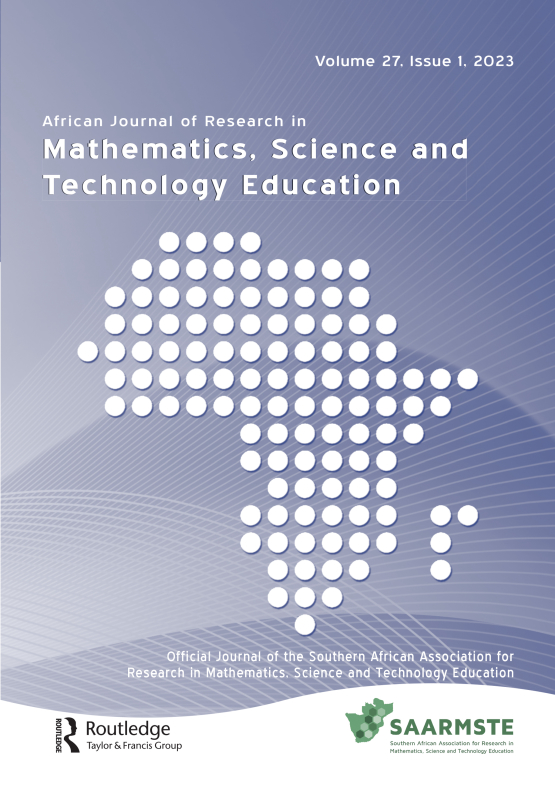Submit a Manuscript to the Journal
African Journal of Research in Mathematics, Science and Technology Education
For a Special Issue on
STEAM education in Africa
Abstract deadline
Manuscript deadline

Special Issue Editor(s)
Fraser Gobede,
University of Malawi
fgobede@unima.ac.mw
Francis Mavhunga,
University of Eswatini
fmavhunga@uniswa.sz
Martin Braund,
University of York
martin.braund@york.ac.uk
STEAM education in Africa
Rationale
The potential of integrating the arts in STEM education (i.e. STEM+A or STEAM) has been reported in the last ten years as part of increasing systemic activity in educational systems recognising the value of the arts and the contribution they make to improving the pedagogical landscape at multidisciplinary and subject levels (Braund and Reiss, 2019; Harris & de Bruin, 2018). Considering art as indigenous in African culture, it has been argued that the integration of arts in STEM brings the cultural wealth of the community in the formal education of its children, thereby making STEM subjects more accessible when viewed in terms of indigenous knowledge (Mchombo, 2018).
For learners, the incorporation of the arts into STEAM provides holistic learning experiences that develop essential 21st-century skills necessary for global citizenship, such as cross-cultural skills, collaboration skills, critical thinking, problem-solving, creativity and innovation (Kennedy & Sundberg, 2020), which make science learning more meaningful and increase motivation. To teachers, STEAM education addresses the theory-praxis dilemma that has long plagued science teachers (Rouleau & Liljedahl, 2017) and enables differentiated instruction, allowing for inclusive education practices at the same time. Regarding strategies for implementing STEAM and wider arts-based pedagogies in the school curriculum, Braund and Reiss (2019) conceive this operating at three levels. At a macro-level, arts-based approaches, including STEAM, imply systemic changes in curriculum design, reorienting away from subject silos to a multidisciplinary landscape. At a meso-level, focused topics are selected involving problem-based situations that allow arts-based integration with STEM and other subjects, and these are commonly cited as examples of STEAM-led learning (for example, see Hero and Quigley, 2016). At a micro, subject level, the STEAM paradigm enables the education system to synergise the capacity of the once-segmented STEAM subjects into combinations of scientific and artistic thinking. In the classroom, some of the examples shared by Braund and Reiss (2019) relating to the integration of the arts to enhance STEAM education include creative writing, visualisations, poetry, and drama.
In accordance with AJRMTE’s main goal of advancing research in mathematics, science, and technology education, contributors to the special issue will share their research findings on how the arts fit in the mathematics, science, and technology education space. Contributors will also examine the policies and frameworks governing STEAM education in African education systems, analysing how these affect their implementation at various levels of education and their impact on the overall STEAM landscape.
Scope
This special issue seeks original research articles, theoretical papers, systematic reviews, case studies, etc, that provide novel insights into the emerging trends in STEAM education in Africa. Topics may include, but are not limited to:
● various conceptualisations of STEAM education, and their geographical origins.
● implementation of STEAM education in the school curricula, showcasing exemplars of integration of the arts in STEAM; starting from holistic STEM education with an arts component (STEM+A); science education with an arts component (S+A); technology education with an arts component (T+A); Engineering education research with an arts component (E+A); and Mathematics education research with an arts component (M+A).
● policies and frameworks governing STEAM education in the African education systems.
● debates around STEAM education, and questions these raise for southern Africa (including what we know about the challenges regarding integrating of STEM itself, and implications for then integrating “A”).
● affordances and constraints of implementing STEAM
● theoretical and methodological aspects of STEAM education research.
We look forward to your valuable contributions and to working together to shape the future of STEAM education in Africa.
Submission Instructions
We invite scholars, researchers, and practitioners to submit their papers for this special issue. Please submit an extended abstract of up to 800 words outlining your proposed paper. Include the title, research questions, methodology, and key findings or contributions.
Please send your extended abstracts and expressions of interest to: Dr. Fraser Gobede, University of Malawi (fgobede@unima.ac.mw) with a copy to Dr Francis Mavhunga, University of Eswatini (fmavhunga@uniswa.sz)
Timeline
● 15 October 2025: Deadline for extended abstract submissions (±800 words) ;
● 15 November 2025: Feedback and guidance on extended abstracts;
● 31 January 2026: Full paper submission deadline;
● 15 February 2026: Papers sent for review 1;
● 31 March 2026: Deadline for reviewers' feedback 1
● 15 April 2026: Deadline for feedback to authors 1;
● 30 May 2026: Deadline for authors submitting revision 1;
● 15 June 2026: Papers sent for review 2;
● 15 July 2026: Deadline for reviewers' feedback 2
● 30 July 2026: Deadline for feedback to authors 2;
● 30 September 2026: Revision 2 returned;
● 15 October 2026: Deadline for editorial acceptance/rejection decision; sent to publisher;
● 30 October 2026: Published online;
● 30 November 2026: SI publication date as AJRMSTE Issue 29.2.
Submission Guidelines
Authors are invited to submit manuscripts that adhere to AJRMSTE guidelines [https://www.tandfonline.com/action/authorSubmission?show=instructions&journalCode=rmse20] on manuscript length, formatting, structure, language, submission process, and originality requirements.
Review Process
All submitted manuscripts will undergo a peer review process in accordance with AJRMSTE guidelines [https://editorresources.taylorandfrancis.com/reviewer-guidelines/] on initial screening, peer review, feedback, revisions, and communication of the final decision.
For any inquiries or support related to the special issue, please contact the guest editors: Dr. Fraser Gobede (fgobede@unima.ac.mw) or Dr Francis Mavhunga(fmavhunga@uniswa.sz).

